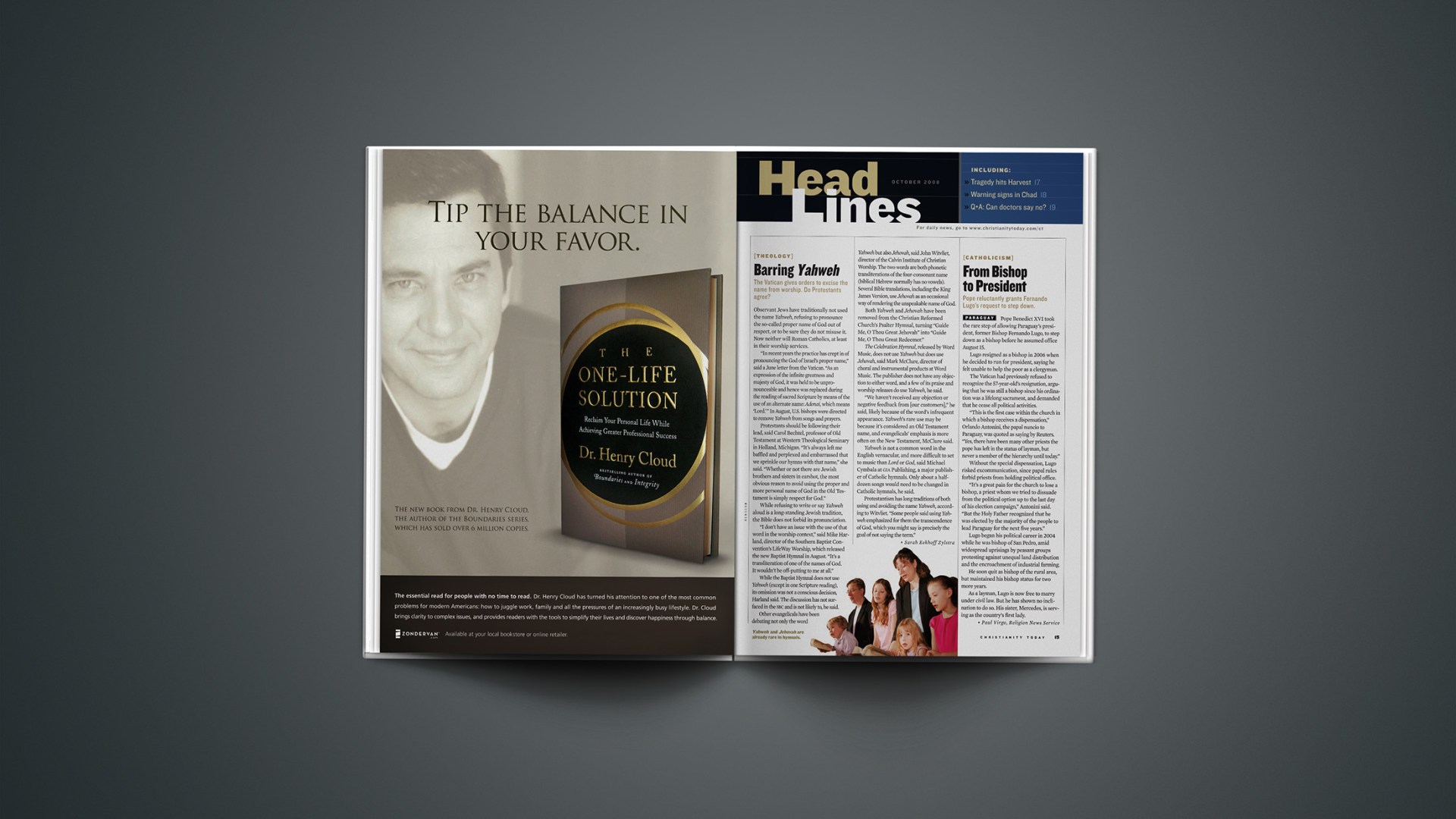Observant Jews have traditionally not used the name Yahweh, refusing to pronounce the so-called proper name of God out of respect, or to be sure they do not misuse it. Now neither will Roman Catholics, at least in their worship services.
“In recent years the practice has crept in of pronouncing the God of Israel’s proper name,” said a June letter from the Vatican. “As an expression of the infinite greatness and majesty of God, it was held to be unpronounceable and hence was replaced during the reading of sacred Scripture by means of the use of an alternate name: Adonai, which means ‘Lord.'” In August, U.S. bishops were directed to remove Yahweh from songs and prayers.
Protestants should be following their lead, said Carol Bechtel, professor of Old Testament at Western Theological Seminary in Holland, Michigan. “It’s always left me baffled and perplexed and embarrassed that we sprinkle our hymns with that name,” she said. “Whether or not there are Jewish brothers and sisters in earshot, the most obvious reason to avoid using the proper and more personal name of God in the Old Testament is simply respect for God.”
While refusing to write or say Yahweh aloud is a long-standing Jewish tradition, the Bible does not forbid its pronunciation.
“I don’t have an issue with the use of that word in the worship context,” said Mike Harland, director of the Southern Baptist Convention’s LifeWay Worship, which released the new Baptist Hymnal in August. “It’s a transliteration of one of the names of God. It wouldn’t be off-putting to me at all.”
While the Baptist Hymnal does not use Yahweh (except in one Scripture reading), its omission was not a conscious decision, Harland said. The discussion has not surfaced in the SBC and is not likely to, he said.
Other evangelicals have been debating not only the word Yahweh but also Jehovah, said John Witvliet, director of the Calvin Institute of Christian Worship. The two words are both phonetic transliterations of the four-consonant name (biblical Hebrew normally has no vowels). Several Bible translations, including the King James Version, use Jehovah as an occasional way of rendering the unspeakable name of God.
Both Yahweh and Jehovah have been removed from the Christian Reformed Church’s Psalter Hymnal, turning “Guide Me, O Thou Great Jehovah” into “Guide Me, O Thou Great Redeemer.”
The Celebration Hymnal, released by Word Music, does not use Yahweh but does use Jehovah, said Mark McClure, director of choral and instrumental products at Word Music. The publisher does not have any objection to either word, and a few of its praise and worship releases do use Yahweh, he said.
“We haven’t received any objection or negative feedback from [our customers],” he said, likely because of the word’s infrequent appearance. Yahweh‘s rare use may be because it’s considered an Old Testament name, and evangelicals’ emphasis is more often on the New Testament, McClure said.
Yahweh is not a common word in the English vernacular, and more difficult to set to music than Lord or God, said Michael Cymbala at GIA Publishing, a major publisher of Catholic hymnals. Only about a half-dozen songs would need to be changed in Catholic hymnals, he said.
Protestantism has long traditions of both using and avoiding the name Yahweh, according to Witvliet. “Some people said using Yahweh emphasized for them the transcendence of God, which you might say is precisely the goal of not saying the term.”
Copyright © 2008 Christianity Today. Click for reprint information.
Related Elsewhere:
The Catholic News Service, Catholic News Agency, and Religion News Service also write on the Vatican’s ban on the word Yahweh.










